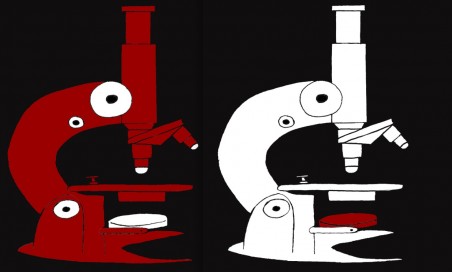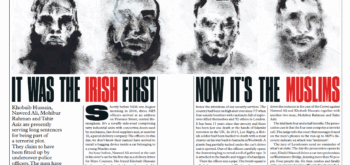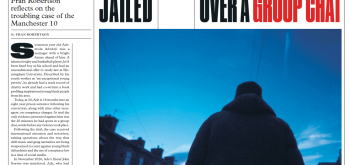The House of Commons’ Science and Technology Committee has been inviting some of the major players in forensics science to give evidence to it about how forensics science is developing (or not) in the aftermath of the decision by the Government to close the Forensic Science Service (FSS).
- Alastair Logan OBE is a retired solicitor who represented the Guildford Four and Maguire Seven and the defendants in eight other terrorist trials between 1974 and 1985. Alastair has represented many applicants in the European Court of Human Rights and now retired continues to work in the field of human rights. He was awarded an OBE for services to justice in 2002.
The initial decision to close the FSS was taken by the Government on the grounds that it was losing money. The Committee had already found that the assertion that FSS was losing £2 million a month was false and that had it been allowed to continue it would have reduced the amount of financial support that it required. This, of course, ignores the fact that no other part of the criminal justice system is required to be profitable. The decision to close the FSS was taken without consultation save with the Association of Chief Police Officers, a body which had consistently demonstrated a poor understanding of forensic science according to the audits carried out on it.
There were a number of people who should have been consulted including the DPP, the Attorney General, the Government’s Chief Scientific Officer and the Forensic Science Regulator. One might be forgiven for suspecting that secrecy was required if the bean counters in the Home Office were to get away with closing it without public scrutiny. By the time that the public and the Science and Technology Committee had been alerted the decision was irreversible.
To its credit the committee has doggedly pursued the issues that have arisen as a result of the closing of the FSS. The Government’s position is that there is no need for a body like the FSS because forensic science can be provided on a competitive priced basis by private forensics science providers. The committee enquired of Dr Gill Tully, formerly head of research and development at the FSS, whether in her view the Government had an effective strategy for the provision of forensic science. She said there was not and that procurement was largely driven by price. The committee heard that there had been major movements in the awarding of contracts with the result that some private providers have had to make staff redundant and are encountering financial instability.
These redundancies are on top of nearly 1,200 redundancies caused by the closure of the FSS which resulted in almost half of the FSS scientists leaving the profession, mostly the most experienced and, therefore, those who could command a higher salary.
A further complicating factor is that an increasing body of forensic investigation is being carried out by in-house laboratories owned and operated by police forces. This makes estimating the size of the forensic science market almost impossible. However it is clear that the forensic science market has decreased substantially from about £160 million a year to somewhere between £90 and £80 million a year. Moreover, whilst this is driven by the need for economies by police forces, the increasing proportion of forensic work now done in-house has ‘robbed’ the competitive market upon which the Home Office stated it was relying as justification for closing the FSS. It remains to be seen how this will affect the provision of forensic science generally and in particular those areas of speciality and the full range of services which were provided by the FSS before its demise.
Forensic Science procurement is driven solely by the police and police budgetary control. Cost driven selection of cases for forensic examination also produces limited examinations of the forensic evidence available. Firms consulted by defence teams in criminal cases are finding that in some cases limited definition has reduced and distorted the total picture that forensic science should produce in certain cases. This in turn could produce a scenario where a defence challenge to the forensic evidence causes the CPS to drop the case because not the right work or not enough work was done initially.
Dr Tully suggested that the preferential course should be a partnership between the police, in-house forensics scientists and the Private market instead of what appears to be a simple tick box approach to commissioning forensic tests and analysis. The present structure of the forensic science industry would not permit that. Moreover the forensic science framework is closed to new entrants for the next four years which must be a huge disincentive.
It is not difficult to see that miscarriages of justice will inevitably occur.
Dr Tully told the Committee:
‘There will inevitably be cases where people are not being convicted because the forensic evidence has not been done to a sufficiently high standard or with the extra context, because a profile was not obtained in the first place or for one reason or another. That would always have happened, but with the decreasing size of the market, and the continuing cuts and instability, it is more likely to happen.’
The fact that innocent people might be convicted on the basis of poor forensic evidence was a major concern of 76% of the many forensic scientists who took part in the survey conducted by New Scientist in February 2012 on the consequences of closing the FSS.
‘The spectre of the innocent languishing in jail for decades without hope of release, something many think would not occur again in the aftermath of the famous miscarriages in the last century beginning with the Guildford Four, is a reality.’
In complex cases the forensic work may be fragmented – given to a number of different forensic scientists, some in-house and some private. This militates against bringing all the evidence together and looking at the forensic science results and analysis in the round.
This is compounded by the fact that only the Police decide what forensic evidence will be used. The destruction of the FSS has also destroyed the specialist sexual offences service provided by the FSS which worked on a partnership basis. Recent events have demonstrated how detection of sexual offences was rendered ineffective by vested interests, negative attitudes, incompetence or prejudice. Now that will be compounded by chaotic forensic support.
And what about research and development formerly done by FSS on which its excellent international reputation was in part based? Concerns have been expressed by many about the future for R&D. Dr Tully told the Committee:
‘If I am brutally honest, the state of research and development in the UK in forensic science is dire. That is largely because there is insufficient funding to do the research and development well. I notice that many submissions to the Committee assume that FSS R and D had been Government-funded. In fact, it was not over recent years. Wherever that funding came from, basically £3 million to £5 million a year has been removed from the total pot of spending on forensic science research. Across academia, there is enormous pressure on funding in all areas. The general view seems to be that it is even more difficult to get funding for forensic science because it is so applied and multidisciplinary.’
One area that is of particular concern is that there is no funding to do the kind of research that is neither wholly in the academic nor in commercial sphere.
The US Government have recently announced funding for both fundamental and applied research in forensic science, recognising this very important issue in the light of a major report into forensic science. We are the only country in the world that has a competitive market for the provision of forensic science to the criminal justice service. Oh! And South Africa has just provided funds to recruit 800 more forensic scientists.








A detailed critique of the Court of Appeal judgment in the case of Oliver Campbell